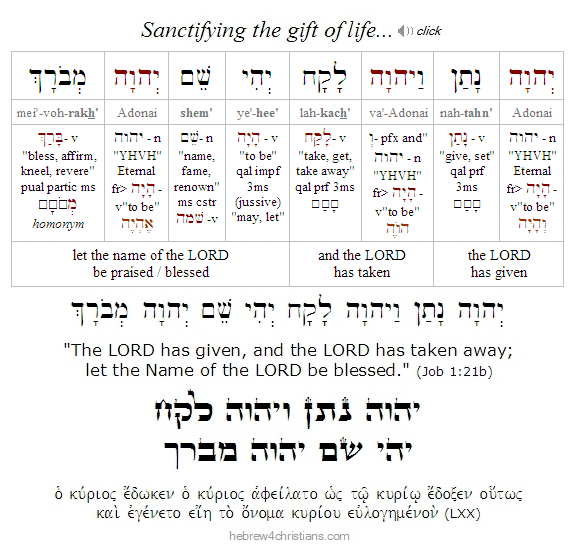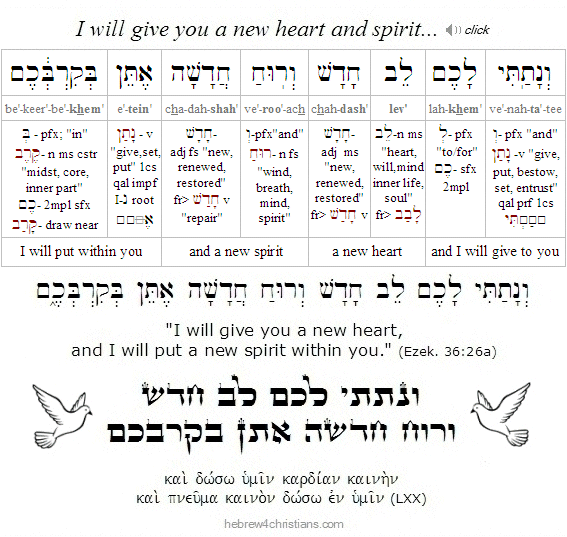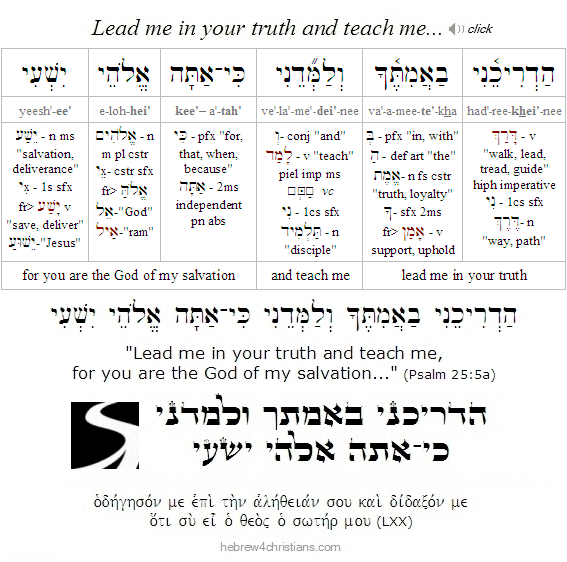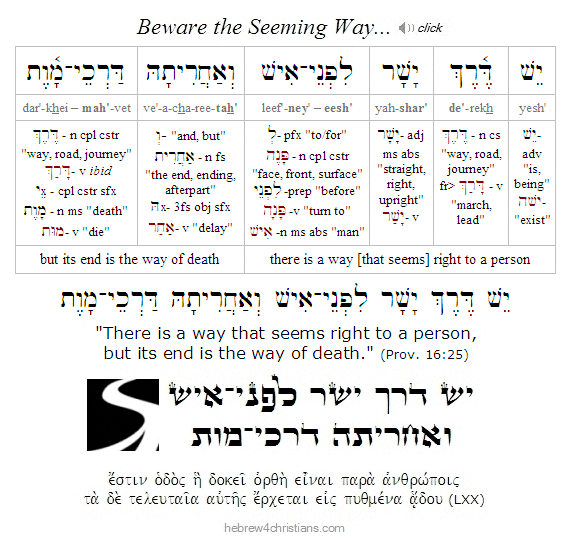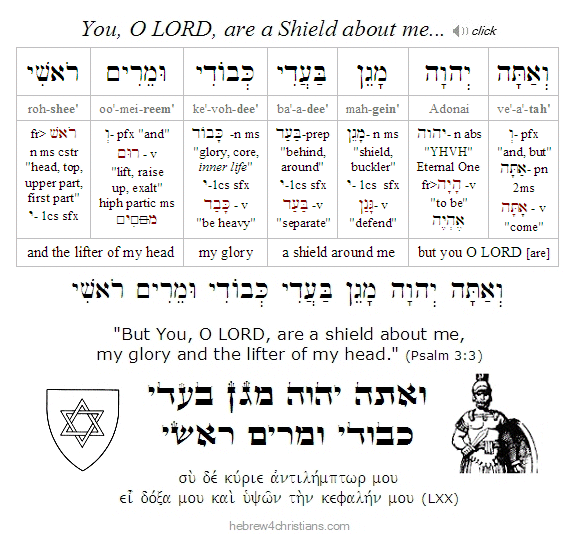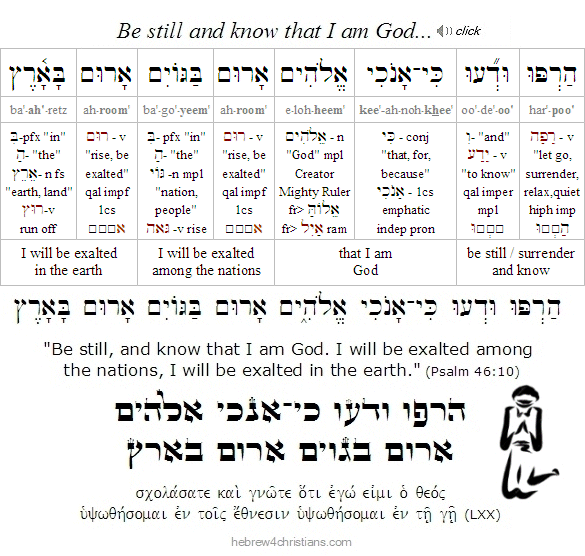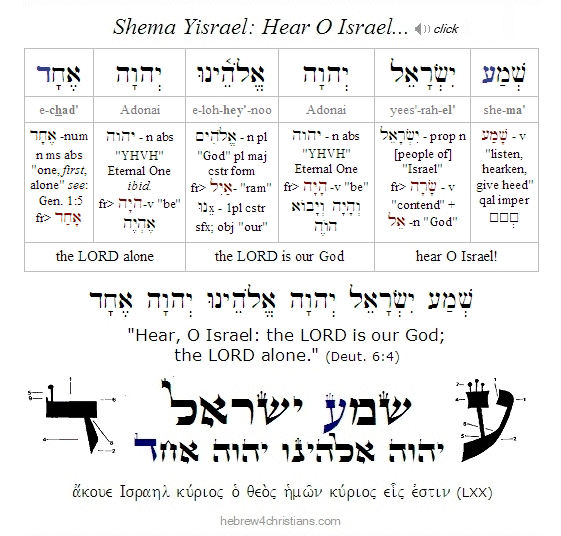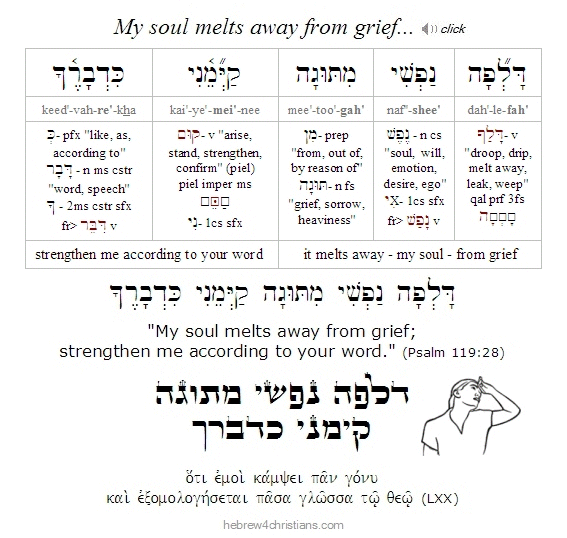|
May 2023 Updates (continued)
Note: If any page content appears to be missing, please refresh the page...
Sanctifying God's Name...

05.04.23 (Iyyar 13, 5783) Some people who profess faith in God become disillusioned when they experience hardship and trials in their lives. They get offended because they had assumed that faith in God ought to be the ticket to the "good life," that is, a life of blessing and ongoing prosperity ("your best life now!"). When unexpected misfortune or tragedy comes, however, their faith in God is shaken and sometimes becomes broken altogether...
This indicates that their faith in God is regarded as a means to the end of personal fulfillment and happiness, and therefore that God is "accepted" so long as things go well for them. The focus, of course, is not so much on God as it is on the self, as God is instrumentally regarded as the gift-giver or "servant" of the soul to be made happy...
An idolatrous conception of God is rooted in self-deception... The Lord does not exist for our sake, but on the contrary, we exist for His. Genuine faith is always tested in the "school of suffering," and our education for eternity is the divine curriculum.
Yes, there are sunny days of comfort and beauty along the way of faith, but there are also days of adversity, trouble, disappointment, and grief. Where is God then, in harrowing moments of anguish and desolation? "God did not spare my dying child.. he did not heed my prayers... How can I trust him now?" "Where was God when I was bereft of my innocence, brought low and forsaken? Where was he when I needed him most?" "How long, O LORD, will you forget me, forever? How long will you hide your face from me?"
Such experiences, as painful as they are, nevertheless are part of the plan of God, his "Torah of adversity" that strips away all our illusory hopes, desires, and dreams so that we might know Him as our only true hope. Our various "idols" of the heart and mind must be demolished; our faulty assumptions exposed, and our world turned upside-down. Our hearts must be first made barren and lost, so that we can come to know God in the truth....
"The LORD has given; and the LORD has taken away: may the Name of the LORD be blessed" (Job 1:21). This is the first great lesson of a mature faith: to bow before the LORD God as the Sovereign Power over all and to accept his decrees. We cannot cajole the LORD to do our will; we can offer him no counsel; we cannot manipulate him through flattery, tears, or defiance... Religious rituals do not propitiate his will. God is the all-powerful one before whom we can do nothing but yield ourselves in trust.
We are not the center of things; God is not our servant to make us happy; we owe our existence to Him alone. All we offer him is our need. The first lesson, then, can be understood as the truth that there is indeed a God, and you are not Him.... Understanding these truths opens your eyes to the reality of the LORD, to His great Majesty and Glory, in which everything about you -- your beginning, your middle, and your end, yea, every moment of your life -- is under his sovereign power and overarching providence. And when you internalize these truths, when you esteem them ardently within your heart, you then can pray to the Living God who is over All, the LORD of Glory who upholds and sustains all things by the word of His power.
The way of faith is not easy, even if our hearts are aflame with the truth of God's overmastering brilliance, power, and grace. There remains the ongoing struggle to accept God's will and to trust in Him despite the darkness of our finitude, brokenness, and powerlessness. Asking why the LORD God does he does leads away from childish ideas of "karma" unto the mystery of suffering, to the cross of Messiah, to the sacrifice of love.
At first we may try to justify suffering for the sake of an inscrutably greater good, but ultimately such reasoning is insufficient and we are rendered silent. If we persevere, we begin to hear the Voice of God from the midst of the whirlwind, as God reveals his glory as the sacred center of Reality before whom all things mysteriously revolve.
We are consigned to live under the "dark cloud of unknowing" because God's plans and purposes exceed all our finite comprehension. We are given precious promises, but we see "through a glass darkly" until our redemption is made complete. We do not need -- nor can we supply -- rationalizations for what God does in his universe, though the life of faith believes that his mercy and love pervades everything (Deut. 4:24).
Meanwhile we will suffer in this world; we will be afraid; we will hurt; we will die, and things will often not make sense to us. But our faith is expressed in courage that is willing to accept all things - both the good and the bad -- as part of God's plan. We are given the cup to drink, just as Yeshua was given, and we can surrender to God's will in baptism despite the sorrows and sufferings we may experience along the way. Remaining faithful to the LORD in the midst of the ambiguities of life is a kiddush Hashem, that is, a life that sanctifies God's Name.
Hebrew Lesson
Job 1:21b reading (click for audio):
Perfectionism and Holiness...

[ The following is related to our Torah reading for this week, Parashat Emor.... ]
05.03.23 (Iyyar 12, 5783) Our Torah portion this week (i.e., parashat Emor) begins by explaining special requirements for Israel's priests, and then goes on to list the yearly cycle of Sabbaths and the seasonal festivals. First of all the priests (kohanim) were required to be "perfect," without any physical defect or uncleanness that might render them unfit for service. Everything about the priests – their clothing, hair style, skin condition, and especially their adherence to the meticulous steps required to offer the daily sacrifice (לֶחֶם אֱלהָיו) - was to be "defect free," and any deviation might incur the penalty of death itself (see Lev. 10:2; Num. 4:15, 2 Sam. 6:6-7). On the other hand, what sometimes disqualified a priest were things simply beyond his control, for instance, a variety of physical disabilities such as blindness, having a limp or disfigured limb, and so on (see Lev. 21:16-21).
Thinking about these requirements raises some provocative questions concerning the meaning of "perfection" in our lives, and particularly how we, as a deeply flawed people, can possibly be "perfect." The question is radical and affects how we are to understand practical holiness or the idea of "sanctification": Are we to seek to be perfect people, and if so, how do we understand what this means? Is our spirituality bound up with perfectionism, with flawless performance, and with always being and doing what is right?
In the Sermon on the Mount Yeshua warned that our righteousness should exceed that of the religious leaders of his day (Matt. 5:20), and he went on to say: "be perfect, as your heavenly Father is perfect" (Matt. 5:48). Here we note that the Greek word translated "perfect" (τέλειος) may mean "mature" or "fully developed" more than morally flawless, though regarding moral and spiritual practice this distinction is not clear cut, especially if by "mature" we mean godly in character, as the context of Yeshua's statement clearly implies (see Matt. 5:1-48). The Hebrew word translated as "perfect" (תָּמִים) can also mean "complete," but it can connote being "wholehearted," "sound," or even healed (שָׁלֵם). So the question arises, does the word "perfect" mean "flawless" or "healed" -- or perhaps both?
Of course we affirm that God alone is truly perfect (Deut. 32:4; Psalm 18:30), completely good (Matt. 19:17), flawlessly righteous (Psalm 145:17), entirely holy (Isa. 6:3; Rev. 15:4), and peerlessly unique (Exod. 15:11; Jer. 10:6-7), but how can we relate to God's overmastering perfection in the midst of our daily flaws and chronic imperfections? How dare we approach "to offer the bread of God" (Lev. 21:17)?
Followers of the LORD are called to be a nation of priests, a "select people," set apart to serve God in holiness (Exod. 19:5-6; 1 Pet. 2:9; Lev. 11:45), but it is clear we are blemished, imperfect, blind, halt, needy, and unclean... This is common to the human condition: all of us, Jew or non-Jew alike, are broken, flawed, and in the midst of the inevitable flow of life that leads to death and decay (Rom. 3:23). We are sick with sin and unable to heal ourselves, and therefore we need a radical transformation - "deliverance from ourselves" – that must come through divine intervention and the miracle of spiritual rebirth (John 3:3,7).
Nevertheless in this world the paradox still remains: we are finite yet long for the undying, the infinite; we are in flux yet anchored in hope; we are a "new creation" yet still saddled with the old nature; we are made holy yet we live in the midst of the profane; we are purified yet still need cleansing; we are healed yet are still wounded; we are redeemed of God yet still need to turn to God in teshuvah; we die daily yet have eternal life. Our hearts are to be a divine sanctuary, yet we are powerless to make God appear in our midst...
Perfection haunts us; we often confuse the ideal and the real. Our romantic visions fail us; all of us are strangers, wanderers, in lonely exile. And the question then becomes – how do we embrace the "already-not-yet," the process, the fleeting days with their poignant moments – within the context of real hope, a vision that heals and brings us real comfort? How do we make peace with our imperfections, our present darkness, and our hunger for deliverance? How do we envision healing in the midst of our brokenness?
Ironically those defects that disqualify us as priests can be transformed (by grace) into compassion for others, and this can enable us to reach out to God in the midst of our flawed existence... After all, the deepest role of the priest is to draw others near to God, but this requires empathy and awareness of the needs of others. Therefore God clothed himself with our frailty, our infirmities, and the brokenness of our sin in order to redeem us in Yeshua. As it is written, we have a high priest who is able to sympathize (συμπαθέω) with our weaknesses (Heb. 4:15). The priest of the New Covenant is a mediator through through poverty of spirit and mourning (Matt. 5:3-8). Just as Joshua the high priest was graciously given robes of righteousness in exchange for his filthy garments (Zech 3), so we are given an imputed righteousness that comes through trusting in "the One who justifies the ungodly" (Rom. 4:5). "For our sake God made Him (i.e., Yeshua) to be sin who knew no sin, so that in him we might become the righteousness of God" (2 Cor. 5:21). This is a righteousness that is "apart from the law, though the law and prophets testified of it; namely, the righteousness of God given through the faithfulness of Yeshua the Messiah" (Rom. 3:21-22). Our present groaning for the complete deliverance is a gift given by the Spirit of God crying out within our hearts (Rom. 8:22-23).
C.S. Lewis once remarked, "God doesn't love you because you are good, but He will make you good because He loves you." This goodness is the miraculous inner working of an imparted godliness, the divine gift of a new heart and spirit (Ezek. 36:26). Awaken to your eternal perfection in the world to come: "You shall be perfect even as your heavenly Father is perfect" can be read as a prophecy. Do not give up, friends; do not succumb to despair. We must learn to endure ourselves and believe in the healing to come. "Do not lose heart. Though our outer self is wasting away, our inner self is being renewed day by day. For this light momentary affliction is preparing for us an eternal weight of glory beyond all comparison, as we look not to the things that are seen but to the things that are unseen. For the things that are seen are transient, but the things that are unseen are eternal" (2 Cor. 4:16-18). And may God help us walk in perfect faith in His unfailing love (Phil. 3:14).
Hebrew Lesson
Ezekiel 36:26a reading (click):
The Ladder of Truth...
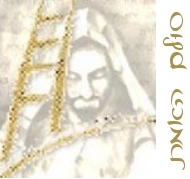
[ "It is not the truth that needs people, but people who need the Truth." - Kierkegaard ]
05.03.23 (Iyyar 12, 5783) The Hebrew idea of "truth" (i.e., emet: אֱמֶת) is richer than factual description or "correspondence" between language and reality, since it contains moral implications and possibilities: what is true is also right, good, reliable (honest), beautiful, and sacred. The Hebrew word comes from a verb (aman) that means to "confirm" or establish, and the noun form (i.e, emunah: אֱמוּנָה, "faithfulness" or "trustworthiness") expresses the will to live by what is ratified, the "amen" of decision.
The Hebrew concept is therefore existential: truth that is not lived is not really truth. Speaking the truth (dibbur emet) and abhorring dishonesty are considered foundational to moral life, as it says: "Speak the truth (דַּבְּרוּ אֱמֶת) to one another; render true and perfect justice in your gates" (Zech. 8:16). Yeshua said, "Amen, amen I say to you...." throughout his ministry to stress the reliability and certainty of God's truth (Matt. 5:18, 26, etc.). Indeed, Yeshua is called "the Amen, the faithful and true witness" (Rev. 3:14). In that sense truth is not a "what" of correspondence but rather a "who," since reality turns on the magnetism of the divine presence (Col. 1:16).
The ancient Greek word translated "truth" is aletheia (ἀλήθεια), a compound formed from an alpha prefix (α-) meaning "not," and lethei (λήθη), meaning "forgetfulness." Greek scholars say the word lethei itself derives from the verb lanthano (λανθάνω), which means "to be hidden," so the general idea is that a-letheia (i.e., truth) is non-concealment, non-hiddenness, or (put positively) revelation or disclosure. Thus the word of Yeshua - His message, logos (λόγος), revelation, and presence - is both "unforgettable" and "irrepressible." Yeshua is the Unforgettable One that is manifest as the express Word of God (דְּבַר הָאֱלהִים). He is the Light of the world (אוֹר הָעוֹלָם) who imparts the "light of life" (John 8:12). Though God's message can be supressed by evil and darkened thinking, the truth is regarded as self-evident and full of intuitive validation (see Rom. 1:18-21).
Note that the LXX (i.e., the ancient Greek translation of the Jewish Scriptures commonly called the Septuagint) dates from the time of the philosopher Plato, though of course the Hebrew text dates back to the time of Moses (13th century BC) and even earlier. About 300 BC, "Theophrastus," a student of Aristotle, wrote of the Jews that 'being philosophers by race, they converse with each other about the Divine." Abraham, who dates from about 2,000 BC, was the first avowed monotheist who openly repudiated the polytheism and idolatry of ancient Ugaritic culture (Abraham also long predates the rise of Hinduism and the animistic hymns of the Vedas and their priestly commentary found in the Upanishads by a thousand years, just as ancient Judaism predates "Islam" by thousands of years). Similarly, both David and his son Solomon (10th century BC) wrote "existential" works of philosophy, predating the modern world by nearly 3,000 years...
Hebrew Lesson:
Psalm 25:5 Hebrew Reading:
Beware False Prophets...

05.03.23 (Iyyar 12, 5783) Every person is a teacher of sorts, teaching others through their choices and actions what they really believe to be true, what they value as worthy, and what they trust for their life... Therefore we are admonished in Scripture not to believe every spirit, but to "test the spirits to determine if they are from God, because many false prophets have gone out into the world" (1 John 4:1). Note that the Greek word used for "testing" (i.e., δοκιμάζετε) means to check for authenticity, that is, to verify that what the person says (or lives) is consonant with the truth revealed in Scripture by the Holy Spirit...
"Beware of false prophets," Yeshua warned, "who come to you in sheep's clothing (literally, "the skins of sheep," ἐν ἐνδύμασι προβάτων), but who inwardly are ravenous wolves. You will recognize them by their fruits" (Matt. 7:15; cp. 2 Pet. 2:1). However, because they come in disguise, pretending to be "children of light," we must be all the more vigilant. On the one hand, we must beware of those who "wrap themselves in a tallit" (legalists) and teach that we should come under the yoke of the law (Matt. 23:15), and on the other, we must beware those who minimize words of the holy Torah, who falsely claim that the way to heaven is "broad," and that we therefore are "free" to walk after the desires of our own hearts (antinomianists). We must use godly discernment, friends. Note this well: The LORD allows false teachers in our midst to test our hearts: "For there must be (δεῖ) factions among you so that those who are genuine among you may be recognized" (1 Cor. 11:19). Therefore "test the spirits" to see if they are "of God," that is, whether they focus on the righteousness of God given exclusively through Yeshua, the "narrow way that leads to life" - or whether they focus on something else. The Holy Spirit always centers the heart on the glory of God revealed in Yeshua (see John 12:32; John 16:14; 1 Cor. 2:2, etc.).
It is written in our Scriptures, "Watch out, friends, lest there be in any of you an evil, unbelieving heart (לֵב מְרֻשָּׁע וַחֲסַר אֱמוּנָה), leading you to fall away from the living God, but exhort one another every day, as long as it is called "today," that none of you may be hardened by sin's deception" (Heb. 3:12-13). Note that the Greek word translated "exhort" here (i.e., parakaleo: παρακαλέω) comes from the same root used to describe the work of the Holy Spirit to strengthen God's people: As Yeshua said: "But the Parakletos (῾ο παράκλητος), the Holy Spirit, whom the Father will send in my Name, will teach you all things and bring to your remembrance all that I have said to you" (John 14:26).
The role of the true prophet is to bear witness to God's truth and to faithfully shepherd God's people. Each and every day, then, we need exhortation from one another to remind us of what is real and to encourage us to turn toward the Living God (Psalm 16:8). As we do this we serve as vessels of God's Spirit, empowering us to remain steadfast and constant in our devotion, and guarding our hearts from the temptation to despair....
Hebrew Lesson:
Proverbs 16:25 reading (click for audio):
Dealing with the Demonic...

[ "We do not wrestle against flesh and blood, but against principalities , against powers, against the rulers of the darkness of this age (τοὺς κοσμοκράτορας τοῦ σκότους τοῦ αἰῶνος τούτου), against spiritual hosts of wickedness in the heavenly places" (Eph. 6:12). ]
05.02.23 (Iyyar 11, 5783) Though the Scriptures teach that the realm of the demonic exists, we encounter its presence usually in thoughts and feelings that torment us. That is where the battle begins. In the mind. The monster that tempted Eve in the Garden got into her head before she bit into the fruit from the forbidden tree. And unless we are on guard against insinuations of godless insanity, we are liable to be under its influence as well...
You might think that demonic oppression is something flamboyant or that requires the ministrations of an exorcist, but long before such intervention may be necessary, the mind has been captivated by evil and deranged thinking. Such thinking may have its origins with a demons named "worry," or "shame," or "unworthiness" or "envy." But a common strategy of the devil is to supply "plausible" ideas that are designed to deceive us and lead us astray.
Everyone is a theologian of sorts. The difference, however, is whether you are a good theologian or one who is swamped with muddled thinking about the issues. As C.S. Lewis once said, "Good philosophy must exist, if for no other reason, because bad philosophy needs to be answered. The cool intellect must work not only against cool intellect on the other side, but against the muddy heathen mysticisms which deny intellect altogether. Most of all, perhaps we need intimate knowledge of the past."
The devil doesn't care if it is a "holier-than-thou" theology, a murky mysticism of "absolute tolerance," or a smarmy disavowal of faith in God altogether --- he is equally pleased with the sensualist as well as the atheist, indeed, he is content with any distortion of the truth, for this enables him to "feed" his deluded ego as the "Prince of Darkness."
In a way, dealing with evil thinking is prosaic and unremarkable. After all, the airwaves of mass media continually disseminate lies, disinformation, and godless thinking in countless formats and by various diabolical stratagems. Whenever we encounter the demonic affecting us, then, we should not panic or be scandalized, but must instead reaffirm the truth of God and resolutely submit to his will (James 4:7). Sometimes this means contradicting the lie by quoting Scripture, offering praise to the Lord, and asking our Heavenly Father for deliverance. In extreme cases, it may be necessary to command the evil spirits to silence their blasphemies and to cease their intrusions. If we find ourselves going out of control emotionally, we are giving ground to the devil. The best tactic is to stay calm and re-center our focus on the Lord who is always present. Salvation means attaining a "safe" mind, set free from deception. There is shalom - that is, healing, wholeness, and soundness of mind - as we regain awareness of the greatness and the beauty and the glory of our God.
Hebrew Lesson
Psalm 3:3 Hebrew reading (click):
Truth and Passion...

05.02.23 (Iyyar 11, 5783) During the prophesied "end of days" (אַחֲרִית הַיָּמִים) many people will have an outer "form" (μόρφωσιν) of godliness but will deny its inner power, since their hearts will be turned away from the truth: "And because lawlessness (i.e., ἀνομία, lit. a=without; nomos=Torah) will be increased, the love of many will grow cold" (Matt. 24:12). In this connection we note that the Hebrew word for "falsehood" (or "lie") is sheker (שֶׁקֶר), which can also be read as shekar (שֶׁקַר), meaning "that which" (-שׁ) makes you cold (קַר). The truth of God can't be known apart from His passion, inner fire, desire. Indeed, the Hebrew word for "sin" (חֵטְא) means "missing the mark," though that essentially means missing the revelation of God's glory because lesser fears consume the heart and cool the passion for the truth... Let us ask the LORD to better know His heart by kindling his fire within our hearts!
"Be still and know that I am..." Prayer is a type of listening (shema), a turning back to heed the message of God's love and hope in Messiah. Indeed, the word "teshuvah" (תְּשׁוּבָה), often translated as "repentance," also means an answer or response to a question. God's love is the question, and the heart's response is the answer. Some of us may find it difficult to trust, to open our heart to receive grace and kindness. For those of us wounded by abandonment, it can be a great struggle to hear the voice of God calling you "beloved," "worthy," "valued," and "accepted." When you find faith to receive God's word of love, however, your heart comes alive and you begin to heal...
Hebrew Lesson
Psalm 46:10 reading (click):
Honoring God's Name...

[ The following is related to our Torah reading for this week, Parashat Emor.... ]
05.02.23 (Iyyar 11, 5783) From our Torah this week (Emor) we read: "You shall not profane my holy Name, that I may be made sacred among the people of Israel" (Lev. 22:32), which the early sages said provides the basis for "kiddush HaShem" (קידוש השם), or the duty to always honor God, even if that might mean enduring martyrdom for your faith.
Jewish halakhah (law) furthermore says we are to think of kiddush hashem whenever we recite the Shema, that our inmost intent should be self-sacrifice (mesirat nefesh), or the willingness to give up your life to God in complete surrender. After all, if we are not willing to give up our lives for God, how can we be willing to genuinely live for him? The purpose or goal of our very existence is to know and love God, to be sanctified in truth, but if we value our carnal lives on earth as more important, we exist in a state of contradiction. Therefore people obsessed with their own physical safety, health, pleasure, happiness, well-being, etc., do not know the true meaning of life...
Our lives on this earth were not meant to be an end in themselves, but rather a means to the greater end of knowing and loving the Eternal God. Indeed, God's love is better than any sort of life this present world can afford. As Jim Elliot once said, "He is no fool who gives what he cannot keep to gain what he cannot lose."
 |
Sanctifying God's Name means we regard our relationship to God to be an end in itself - our ultimate concern - and there is therefore nothing higher that may challenge our duty before heaven. "Seek first the kingdom of God and his righteousness" (Matt. 6:33). Indeed our mortal life in this fleeting world is a means to the end of reaching our eternal destiny, and esteeming the means above the end is therefore idolatry (Rom. 1:25).
Our faith in the LORD may lead us into collision with the world and its spurious power structures, however "we ought to obey God rather than men" (Acts 5:29). Taking a stand for Torah truth will make you an outsider to the "crowd" and its endless idols and vanities. Indeed a person of genuine moral conviction may be labeled an "enemy of the state," may be persecuted as a "terrorist," and may even suffer martyrdom.
Shadrach, Meshach, and Abednego rightfully defied the king's decree to bow down before the "golden image," and they confessed that they were willing to die rather than betray the truth of the LORD of Israel (see Dan 3). This is a prime example of kiddush HaShem, of honoring the truth of God even at the risk of losing our lives. For many Jews, reciting the Shema is a solemn declaration that we esteem the truth of God above all things, that God alone is our ultimate good, and that we must be willing to surrender our lives rather than to deny the greatness and glory of His Name. Many tzaddikim have died with the Shema on their lips...
Kiddush HaShem may be understand both literally and metaphorically. Literally understood, kiddush HaShem (i.e., martyrdom) is a possibility, one of the severest tests that may be given to the soul, and the temptation is to shrink back from the threat of death by denying the faith... Metaphorically understood, kiddush HaShem is a necessity, an essential act of the will that decides to "take up the cross" and follow Yeshua, and the temptation is to minimize the truth, to compromise the faith, and thereby to slowly fade away... In this connection Yeshua asks, "What will it profit a person if he gains the whole world and forfeits his soul?" (Mark 8:36). Indeed, finding your life, value, and "place" here is to exile yourself from the promise of heaven. As Yeshua said, "Whoever finds his life will lose it, and whoever loses his life for my sake will find it" (Matt. 10:39). What is required, in other words, is categorically everything, with nothing left over. As Dietrich Bonhoeffer reminds us: "Salvation is free, but discipleship will cost you your life."
Hebrew Lesson:
Deut. 6:4 reading with comments (5 min audio):
Torah of Tears...

05.01.23 (Iyyar 10, 5783) The Scriptures are filled with desperate cries from the wounded of heart... "How long, O LORD? Will you forget me forever? How long will you hide your face from me? How long must I take counsel in my soul and have sorrow in my heart all the day?" (Psalm 13:1-2). "Make haste to help me, O LORD, my salvation!" (Psalm 38:22). "My soul melts away from grief; strengthen me according to your word" (Psalm 119:28). "Answer me quickly, O LORD! My spirit fails! Hide not your face from me, lest I be like those who go down to the pit" (Psalm 143:7). God know that "hope deferred makes the heart sick" (Prov. 13:12), so there can be no turning to God, no teshuvah, apart from the presence of real hope (תִּקְוָה). Indeed, as the Apostle Paul wrote: "We are saved by hope" (Rom. 8:24).
The apostle Peter wrote, "for a little while, if necessary, you have been grieved by various trials" (1 Pet. 1:6), which indicates that sorrow and grief are part of the walk of faith. Troubles, oppression, heartache, loneliness, loss, and so on, can grieve and seriously depress us. Lev yodea marat nafsho, "the heart knows its own bitterness" (Prov. 14:10). The cry of the heart is directed heavenward: "I am suffering terribly; O LORD, revive me according to your word" (Psalm 119:25); "for I am on the verge of collapse; my pain is always with me" (Psalm 38:17). We must be careful not to judge those who are hurting by regarding them as weak in faith or perhaps even deserving of their sorrows. On the contrary, the Lord sometimes allows the soul to be grieved by various trials; the heart is broken, the light of the eye grows dim... and there is no ready answer....
Your Heavenly Father sees in secret -- yea, even the secret sorrow and dread of your heart. You may languish and shed tears, but the pain drives you to lonely places of despair and darkness. Our Lord is present for those who are hurting; he heals the shattered of heart and binds up their wounds (Psalm 147:3). Tehom-el-tehom: "deep calleth unto deep." There are depths where we must be alone, but it there where our sorrows find voice to lament and cry out for God's comfort in the midst of our sorrows. "For in Thee, O LORD, do I hope; thou wilt hear, O Lord my God" (Psalm 38:15). Kiviti Adonai, kiviti nafshi: "I wait for the LORD, my soul doth wait, and in his word do I hope; my soul waiteth for the Lord more than they that watch for the morning: I say, more than they that watch for the morning" (Psalm 130:5-6).
We sometimes sigh: "O Lord, I know that Thou wilt help us; but wilt Thou help us before Thou wilt help us?" It's not always easy to wait for God, especially when we are in pain or anxiety, but we must never give up; we must never abandon our heart's longing for ultimate healing. Faith exercises hope in the reality of God's love and is captive to undying hope (Heb. 11:1). Therefore the Spirit cries out: "Hope to the LORD; be strong and strengthen your heart; and (again) hope to the LORD" (Psalm 27:14). "Blessed are you, LORD our God, King of the Universe, who walks with the wounded of heart".
 |
Hebrew Lesson:
Psalm 119:28 Hebrew Reading (click):
Welcomed in His Presence...
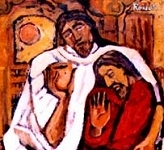
[ "Just as in earthly life lovers long for the moment when they are able to breathe forth their love for each other, to let their souls blend in a soft whisper, so the mystic longs for the moment when in prayer he can, as it were, creep into God." - Soren Kierkegaard ]
05.01.23 (Iyyar 10, 5783) "Not being welcome is your greatest fear. It connects with your birth fear, your fear of not being welcome in this life, and your death fear, your fear of not being welcome in the life after this. It is the deep-seated fear that it would have been better if you had not lived" (Nouwen). The message of the gospel is - above all else - an invitation, a cry of welcome, that sings out to you in your loneliness and shame. The core of the battle is here - whether you will decide to trust in God's love or shrink back into the places of darkness, isolation, and pain. Yeshua says, "Come to me; I love you, I accept you; I receive you; please, be welcome with me; I will take your hand, I will be with you..."
I've wrestled with this sort of painful fear for as long as I can remember... a sense of not being welcomed, of not belonging, being "outside" looking in... For me, heaven is a sense of home, of acceptance, a place where you are "inside out" and yet completely loved. In short, heaven is nothing less being loved and accepted by the Lord, and hearing him say, "I love you; you belong to me; I call you my friend..."
Lord I need you; I need you more than my next breath or heartbeat, for your lovingkindness is better than life itself... I come before you; this is my request: that I might know your love, and that you might know my heartache for you. You said "seek my face, and my heart said to you, 'Your face, Lord, do I seek." Do not leave me bereft of comfort, O God; do not hide your face from me. For "whom have I in heaven but you? And there is nothing on earth that I desire besides you. My flesh and my heart may fail, but God is the strength of my heart and my portion forever..."
There is much talk about "receiving Jesus" into our hearts, but it is even more important to understand that He receives us into His heart... Shalom to you, dear friends. May God fill you with a sense of His welcome, his acceptance, and his delight in you. Amen.
Hebrew Lesson
Psalm 63:3 reading (click):
Walking in the Light (אור התורה)

05.01.23 (Iyyar 10, 5783) While it is wonderfully true that Yeshua died to free us from our sins, the corollary is that he imparts life for us to walk in the light of his glorious Divine Presence (2 Cor. 5:15). The two go together. You are redeemed by God to serve him. Simply believing (or hoping) that "Jesus died for your sins" doesn't mean walking through your days without any thought of where you are going. Our teshuvah must make traction with our feet as we go forward by faith. This means we have a responsibility to practice the truth of Messiah, partaking his vision, hashkafah (philosophy) and compassion. Indeed each of us will give account for his or her life before God, as it is written: "For we must all appear before the judgment seat of the Messiah (כסא־דין המשיח), so that each one may receive what is due for what he has done in the body, whether good or evil. Therefore, knowing the fear of the Lord (יראת יהוה), we persuade others" (2 Cor. 5:10-11).
Amen, we must learn to be conscious of life's great sanctity its eternal significance... Each of us is "on the road" of life going someplace; each of us has an appointment with the full revelation of the truth.... Therefore, since we only have this hour, understand today to be "the day of salvation" (יום הישועה). "No creature is hidden from His sight, but everything is naked and exposed to the eyes of him to whom we must give account" (Heb. 4:13). Therefore the Spirit admonishes those who have ears to hear: "Take care, friends, lest there be in any of you an evil, unbelieving heart, leading you to fall away from the living God, but exhort one another every day, as long as it is called "today," that none of you may be hardened by the deceitfulness of sin. Today - if you hear His voice - harden not your hearts (Heb. 3:12-13,15).
Friend, everything matters; nothing is trivial; and there is a weight of glory that surrounds our lives... Therefore act as if your choices have eternal significance, because they really do; pray as if your life depends on it, because it really does. Praying in accordance with the will of God - namely, for you to know God, to walk in the light of love, joy, peace; to be filled with wisdom, patience, kindness, and so on, will assuredly move heaven and earth (1 John 5:14). God is forever faithful and always hears those who call out to him with sincerity of heart: "The LORD is near to all who call out to him, to all who will call out to him in truth" (Psalm 145:18).
Hebrew Lesson:
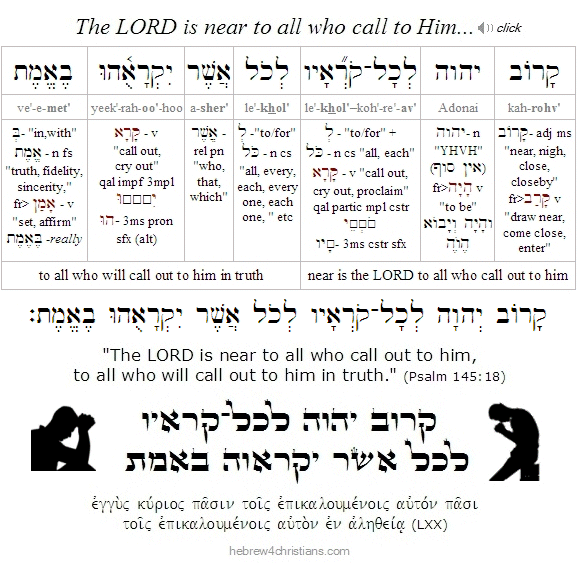 |
Stealing the Mind (גְּנֵבַת דַעַת)

05.01.23 (Iyyar 10, 5783) It is written in Torah portion Kedoshim: "You shall not put a stumbling block before the blind (לִפְנֵי עִוֵּר לא תִתֵּן מִכְשׁל); you shall fear God; I am the LORD" (Lev. 19:14). Just as no one can deny the validity of logic by means of argument, so no one can intelligibly deny that truth is necessary... Indeed, every person intuitively believes that truth exists, since otherwise he or she would not ask any questions or make any statements. In other words, we instinctively presuppose the value and reality of truth whenever we communicate, and we understand that there is an implied social contract to be honest and not to deceive others. Deceitful language puts a "stumbling block before the blind" when it is used to withhold important information from others. Politicians who make mutually exclusive promises to different groups of people are dishonest and cloak their true intentions. The same may be said about people who sell products or services using misleading claims.
Those who willfully misdirect others violate the ninth commandment not to bear false witness (Exod. 20:16; 23:1). Such deception is called "genevat da'at" (גְּנֵבַת דַעַת), or "stealing of the mind," since it defrauds another person's thinking. Misleading people is a violation, then, of both the commandment not to steal and the commandment not to bear false witness. The Torah warns us never to exploit other people's vulnerability or to take advantage of their good will and trust. Those who use false words and deceitful language to blind the eyes of the gullible will assuredly face judgment, as it is written: "No creature is hidden from God, but everything is naked and exposed to the eyes of him to whom we must render an account" (Heb. 4:13). Lying to others is desecration, profanity, and ultimately a form of violence. Those who cause others to stumble will tragically discover that truth will be a stumbling block to them. May God help us to fear Him and to be yashar – upright in our communication with others. Therefore may each of us proclaim: "I have chosen the way of truth; I have set your judgments before me" (Psalm 119:30; also 2 Tim. 2:19).
דֶּרֶךְ־אֱמוּנָה בָחָרְתִּי
מִשְׁפָּטֶיךָ שִׁוִּיתִי
de'·rekh · e·moo·nah · vah·char'·tee
meesh·pah·te'·kha · sheev·vee'·tee

"I have chosen the way of truth;
I have set your judgments before me." (Psalm 119:30)

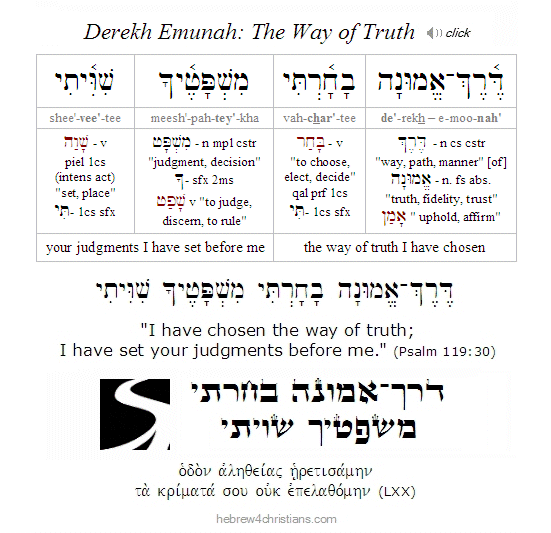
Theodor Herzl Day...
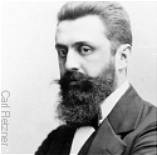
05.01.23 (Iyyar 10, 5783) Today is commemorated as "Herzl Day" in Israel, a national holiday established by the Knesset to commemorate the achievements and Zionist vision of Theodor Herzl (1860-1904), a man considered by many to be the father of the modern State of Israel. During Herzl Day a memorial service held on Mount Herzl in Jerusalem, the site of Israel's national cemetery, where Herzl's tomb is located. It should be noted that though Herzl was a remarkable man, he was greatly helped by Bible-believing Christians who likewise foresaw the vision of Zion and the reestablishment of the State of Israel and who therefore assisted him by providing support for his political vision.
For more information about Herzl Day, click here.
Hebrew Lesson
Psalm 137:5 reading (click):
<< Return
|








